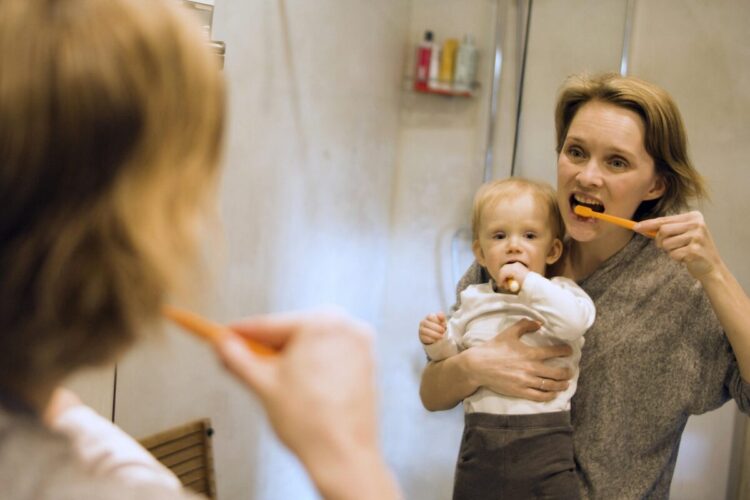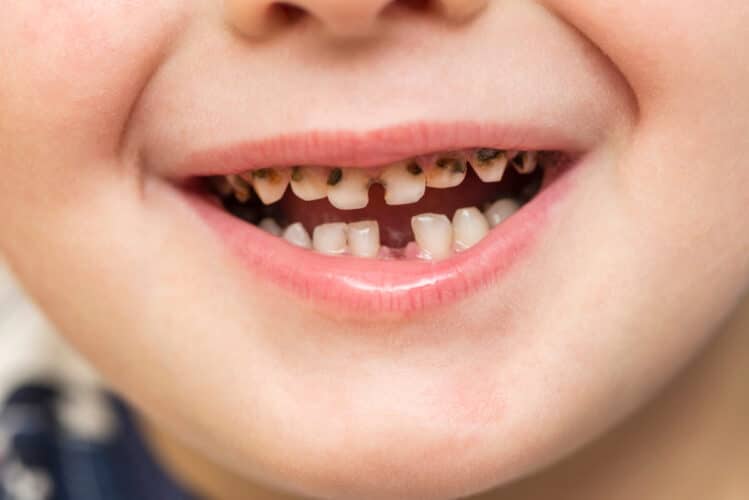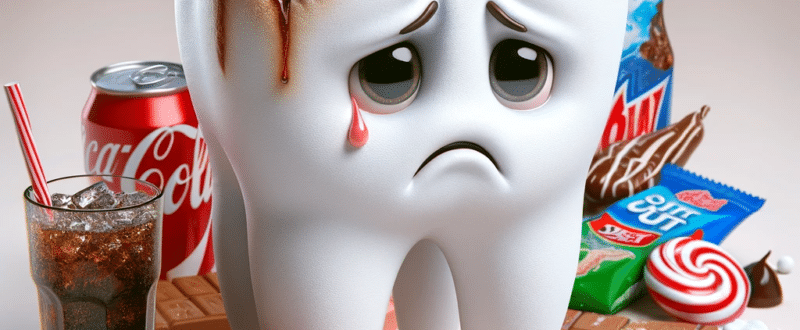Tooth Decay in Children
Tooth Decay in Children
Beginning the journey of parenthood brings with it many responsibilities, one of which is ensuring the child’s dental health. A common challenge faced in this realm is tooth decay in children. It’s not just about cavities; it’s about protecting your child’s teeth to give them a lifetime of healthy smiles. At our dental clinic, we believe in empowering families and caregivers with knowledge and support.
As a dedicated paediatric dentist, we aim to provide you with essential information and practical tips to prevent and address this widespread issue. Let’s work together to keep those little smiles bright and healthy!
 Tooth Decay: Damage to Young Tooth Enamel
Tooth Decay: Damage to Young Tooth Enamel
Tooth decay in children is a common problem. It starts small but can quickly become a big issue. Think of tooth enamel as a shield for each tooth. When harmful sugars from food and drinks stick to the child’s teeth, they can cause damage.
Let’s break it down: When a child’s first tooth appears, it’s a moment to celebrate but also a time to start taking care of those tiny teeth. Decay can happen in baby teeth and later affect permanent teeth. The key is to catch it early. High bacterial content from decayed baby teeth can affect the erupting permanent teeth, leading to cavities in these new teeth. The progression of decay from baby teeth can extend deeper into the root canals and into the underlying bone, potentially creating an acidic environment that adversely affects the developing permanent tooth. This can result in complications like abscess formations, decay progression, and permanent staining of the adult tooth. Additionally, untreated cavities in baby teeth can cause infections that may spread to other parts of the body, leading to severe health issues.
Our specialist kids dentists in Brisbane focus on preventing decay by teaching good habits early on. Brushing, using the right toothpaste, and regular dental check-ups are all parts of high-quality dental care that families and caregivers can provide their little ones with.
Remember, protecting baby teeth is essential. They hold space for future permanent teeth. If baby teeth are lost too early, it can cause spacing issues later. That’s why caring for your child’s first teeth is more important than you might think! Let’s keep those little smiles healthy and bright.
When to Start Dental Care for Your Child
The best time to start thinking about your child’s oral health is actually sooner than you might think. As soon as your baby’s first tooth pops up, it’s time to get going on dental care. It is usually around six months old. You don’t need to wait for a full set of teeth to start good habits. Remember, the first dental visit should be scheduled by their first birthday. This visit is more about getting your child comfortable with the paediatric dentist and checking for any early signs of dental problems. A healthy smile starts early, and taking these steps can help ensure your child’s permanent tooth comes in just right. So, let’s keep those tiny teeth healthy!
Common Causes of Tooth Decay in Children
Tooth decay is like an uninvited guest that can easily overstay its welcome in a child’s mouth. It starts when bacteria in the mouth begin to feast on sugars from the food a child eats, producing acids that eat away at the teeth. This process can lead to holes in the teeth, commonly called dental caries. Factors such as not brushing enough, snacking on sugary treats, or even genetics can play a part in this. It’s important for kids to maintain good oral health to keep tooth decay at bay.
Dietary Choices Leading to Tooth Decay in Children
The road to healthy child’s teeth isn’t just paved with good intentions; it’s also about smart eating choices. Foods high in sugar, like candies and desserts, as well as starchy foods, can cling to teeth and feed the harmful bacteria. Sipping on carbonated beverages and fruit juices can also contribute to decay, as they often contain high levels of sugar and acids.
Oral Hygiene Habits and Their Impact on Oral Health
The cornerstone of preventing tooth decay is a solid oral hygiene routine. It means making sure your little one brushes their teeth thoroughly and learns the proper brushing techniques. It’s essential to start brushing as soon as the first tooth appears. Also, fluoride is a big ally—it strengthens the enamel and helps prevent cavities. Your paediatric dentist will advise on the best type of toothpaste for your child based on their age and overall dental health.
Effects of Feeding Practices on Baby Teeth
Those bedtime bottles might comfort your child, but if they contain anything other than water, they could be harmful to baby teeth. Milk or juice can pool around the teeth as a child sleeps, which encourages decay. Similarly, frequent snacking without brushing can lead to trouble for tiny teeth.
Genetic and Health Factors in Dental Decay
Sometimes, despite our best efforts, genetics step in. Just like eye or hair colour, a tendency towards tooth decay can run in families. If there’s a history of dental woes, your child could be at a higher risk. Additionally, some medications can affect saliva production, which is essential in washing away food particles.
Lifestyle and Environmental Factors
A child’s environment can significantly impact their dental health. If a child’s diet lacks certain nutrients, or if they live in an area without fluoridated water, they might not have all the defences they need to fight off tooth decay. That’s why it’s so important to see a dentist regularly. Paediatric dentists can help identify these risk factors early on and work with you to protect your child’s smile.
Remember, the first visit to the dentist should happen by the time the first tooth emerges or by their first birthday. Left untreated, tooth decay can lead to pain, infection, and even premature tooth loss. But with the right care, you can help ensure your child’s gums and teeth stay healthy from the start, setting them up for a lifetime of bright smiles.
 Early Signs of Tooth Decay in Children to Watch For
Early Signs of Tooth Decay in Children to Watch For
Spotting tooth decay early in young children is key to keeping their smiles healthy. Keep an eye out for white spots or lines on the teeth, especially near the gum line, as these can be the first telltale signs. If you notice any brown spots or your child complains of tooth pain, it’s time to act fast.
Choosing the Right Dental Products for Kids
Picking the right tools for your child’s oral health routine is as important as the routine itself. Go for a toothbrush that’s just the right size for their little hands and mouth, with soft bristles to protect tender gums. When it’s time to introduce toothpaste, consult your child’s dentist. They might suggest starting with a fluoride toothpaste earlier if your child is at a higher risk for tooth decay.
From the age of eighteen months, a small pea-sized amount of low-fluoride toothpaste is typically perfect for keeping tiny teeth clean without overdoing it. Choose a paste with a friendly flavour to make brushing a fun activity for them, ensuring they look forward to it every morning and night. And let’s not sideline dental floss; it’s crucial for tackling those tricky spots that a toothbrush can’t reach. Steady brushing twice a day and proper flossing are the duo that will keep those cavities at bay and ensure your child’s smile stays bright and healthy.
How to Prevent Tooth Decay in Children through Proper Hygiene
Keeping your child’s teeth strong starts with a solid oral health routine. Make sure they brush twice a day with age-appropriate fluoride toothpaste to prevent tooth decay. It’s like their teeth’s personal shield against the bad guys – bacteria and sugar. Show them how to brush all the surfaces of their teeth, even the ones at the back that are hard to reach.
And it’s not just about the teeth – don’t forget the gums and tongue! A healthy diet is also a superhero in this story. Encourage snacks that are kind to teeth, like fruits and vegetables, and also tap water – it’s often fortified with fluoride, which is fantastic for their chompers. Lastly, regular check-ups at the dental clinic from a young age can help catch any small issues before they become supervillains.
How Is Tooth Decay Treated?
If tooth decay does sneak up on a child’s teeth, there’s no need to worry. Dentists have lots of tools in their belts to fix the problem. Small cavities can be filled, bringing back that tooth’s strength. If the decay has been a bit more sneaky and caused more damage, dental treatment might involve something like a crown to protect the tooth.
Sometimes, if the tooth is a real hero and just has a tiny bit of decay, a fluoride varnish can be painted on to stop the decay in its tracks.
Dental sealants are like invisible capes for teeth, keeping them safe from decay. Dental sealants are typically applied to the chewing surfaces of the back teeth—molars and premolars—where decay occurs most often. This preventive measure is especially effective in children and teenagers but can also be beneficial for adults at risk of cavities. Sealants are easy to apply, requiring only a few minutes per tooth, and can effectively protect teeth for many years, though regular dental check-ups are necessary to monitor their condition and effectiveness.
Remember, it’s always best to see a dentist regularly because catching things early can save a lot of trouble later on. If needed, a specialist paediatric dentist will have just the right touch for kids’ dental needs and can give helpful advice on how to keep those pearly whites, well, pearly white!
Helping Your Child Feel at Ease at the Dentist
Visits to the dentist can be a breeze for your little one. Many dental offices are like playgrounds these days, with colours and games that make your child feel right at home. If your child is a bit nervous, happy gas, also known as laughing gas, is a gentle way to relax those jitters.
It’s safe, and it wears off fast, so after the visit, they can go back to their day with just a smile. For those who need it, sleep dentistry is another option where they are completely unconscious through the procedure. It’s all about making sure your child has a chill time while taking care of their dental care.
Why Regular Dental Check-Ups Are Essential
Regular check-ups at the dentist are essential for your child’s good dental health. These visits are the secret weapon to prevent tooth decay and spot any sneaky signs of trouble early on.
Staying on top of dental treatment means small issues don’t turn into big ordeals. Regular visits also help build a positive attitude towards paediatric dental care. They teach kids that caring for their teeth is just a normal part of life. This is especially important for children with special health care needs who might need a bit more care. Plus, it’s the perfect time to ask all your questions, from poor oral hygiene to worries about dental trauma – your dentist is there to help keep those smiles sparkling.
 Your Child’s Smile Matters: Visit Us at Pure Dentistry
Your Child’s Smile Matters: Visit Us at Pure Dentistry
The best time to start thinking about your child’s oral health is actually sooner than you might think. As soon as your baby’s first tooth pops up, it’s time to get going on dental care. It is usually around six months old. You don’t need to wait for a full set of teeth to start good habits. Using a small, soft brush and a tiny smear of fluoride toothpaste is a great start. Not only does this keep their child’s teeth clean, but it also sets the foundation for good dental hygiene.
Remember, the first dental visit should be scheduled by their first birthday. This visit is more about getting your child comfortable with the dentist and checking for any early signs of dental problems. A healthy smile starts early, and taking these steps can help ensure your child’s adult tooth comes in just right. So, let’s keep those tiny teeth healthy! Book an appointment today 07 3343 4869. and let’s keep those pearly whites healthy.





































